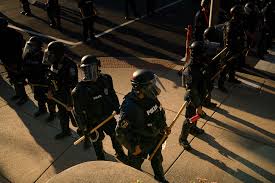Washington, D.C. — As tens of thousands march through the streets of cities like St. Louis, Minneapolis, and Washington, D.C., grieving yet another life lost—this time, 24-year-old Malik Owens—the nation finds itself at a painful and all-too-familiar crossroads. The call is the same: Justice. Reform. Accountability. But the response from Congress remains stalled in the same morass of partisan division and political inertia that has haunted this issue for decades.
Despite overwhelming public support for reforms like banning chokeholds, enforcing body camera usage, and curbing qualified immunity, federal action has once again failed to materialize in any meaningful form. Many Americans are left asking: Why does change seem impossible when the need feels so urgent—and so widely agreed upon?
A Broken Promise, Repeated
In the immediate aftermath of George Floyd’s murder in 2020, the U.S. seemed on the cusp of historic reform. The George Floyd Justice in Policing Act passed the House of Representatives in early 2021, fueled by nationwide protests and rare bipartisan dialogue. Yet, despite months of negotiation, the bill collapsed in the Senate—stopped cold by irreconcilable disagreements over key provisions, particularly qualified immunity.
Since then, the national appetite for reform has only intensified. Tragedies like the fatal shooting of Malik Owens in St. Louis continue to stoke outrage, with renewed protests sweeping across the country this week. And yet, the political machinery in Washington has changed little.
“We hear your voices. We feel your pain,” lawmakers often say. But many communities feel abandoned, locked in a cycle of hope and heartbreak.
The Roadblocks: Deep and Entrenched
At the heart of the impasse lies qualified immunity, the legal shield that often protects officers from civil lawsuits—even in cases involving deadly force. Reformers say it prevents justice and allows misconduct to thrive. But conservative lawmakers and powerful police unions argue that removing it would deter good officers and flood courts with baseless claims.
“We’re not against police,” one protester said in St. Louis Tuesday night. “We’re against a system that protects the bad ones and punishes us for speaking up.”
Police unions, some of the most influential lobbying bodies in the country, have fiercely opposed sweeping federal mandates, framing them as unfair constraints on already difficult and dangerous work. Their resistance, coupled with partisan brinkmanship, continues to stymie reform efforts—even as public opinion tilts decisively in favor of change.
A recent poll showed nearly 70% of Americans, across party lines, support stricter use-of-force policies and independent investigations into police misconduct. But in today’s fractured political climate, even ideas with broad support are politicized to the point of paralysis.
A Nation Stuck in Place
What emerges is a painful cycle: A fatal encounter with police grabs headlines. Vigils are held. Marches erupt. Lawmakers promise action. Hearings take place. And then… nothing.
For the families who have lost loved ones and for the communities that live in fear and mistrust, the inaction is not just disappointing—it’s devastating.
“How many more?” a sign read outside the Capitol this week. “How many more before you care enough to act?”
President Biden signed a limited executive order in 2022 targeting federal law enforcement practices, but activists and policy experts agree: true reform demands congressional action.
The Question That Remains
There are signs of renewed legislative interest—ongoing talks among key senators about revising the Justice in Policing Act—but few are optimistic. The path forward is uncertain, and with every day that passes without progress, the divide between public urgency and political will grows wider.
For now, the protests continue, not as a sign of hope fulfilled, but of hope deferred. And the question remains:
Can Washington finally match the moral clarity of the people it serves—or will it remain paralyzed while the nation mourns, again?
